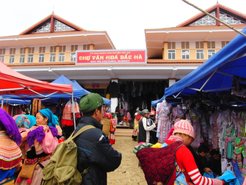New Markets in Upland Culture: State Development Directions and Ethnic Minority Traders in the Northern Borderlands of Vietnam
In the mountainous northern borderlands of Vietnam - home to a significant number of officially-designated ‘minority nationality groups’ - local periodic markets have featured for centuries as an important part of the social and economic landscape. Moreover, border residents have long sustained their livelihoods through cross-border goods exchanges and nurtured strong ties with kin in China. While market trade grows increasingly important within the livelihood portfolios of uplanders, minorities such as ethnic Hmong continue to be labelled as autarkic societies lacking in entrepreneurial ‘know-how’. Thus, the Vietnam state’s agenda to develop the ‘economically inefficient’ northern upland region involves the ‘modernisation’, upgrading, and regulation of local marketplaces. This imposes a standardised model of how markets should look and how traders should behave which supports fixed, licensed trading from a permanent market structure. As a result, alternative approaches to trade that deviate from this norm get devalued and defined as ‘backward’ or inefficient - in need of correction in order to be brought into line.
At the same time, as of the mid-1990s, in the wake of Vietnam’s transition to a liberalised economy ‘with socialist orientation’, both international and domestic cultural tourism to upland ethnic minority areas has flourished. The Vietnam state has thus begun to reframe minority culture as a resource wielding economic potential. Concurrently, ‘ethnically colourful’ upland markets are being assessed for their economic potential, as state and private stakeholders alike seek to promote cultural tourism and ‘cultural commodities’ for external consumption.
In light of these processes, set in the northernmost province of Lao Cài, bordering China’s Yunnan province, this research investigates the frontier area particularities of small-scale market and cross-border trade, with a particular focus on the activities undertaken by ethnic Hmong trade participants. Upland rural marketplaces in the borderlands are conceptualised as critical social interfaces wherein differing ideologies and multiple meanings of markets, improvement, and progress exist for different groups, and must be negotiated.
Key research questions are:
1. How does the Vietnam state’s conceptualisation of upland markets (chợ vùng cao) and ‘cultural markets’ (chợ văn hoá) for economic development and tourism marketing promotion resonate with how ethnic minorities view and use such marketplaces? What are the impacts of domestic and international tourism on upland residents?
2. In what ways do Hmong ethnic minorities draw upon kinship, social networks, gender, language and ethnic identities with regard to upland and cross-border trade practices, trade relations, consumption needs, and how market information is spread? How do these various elements feature vis-à-vis how Hmong actors negotiate access to trade with each other as well as other upland groups?

